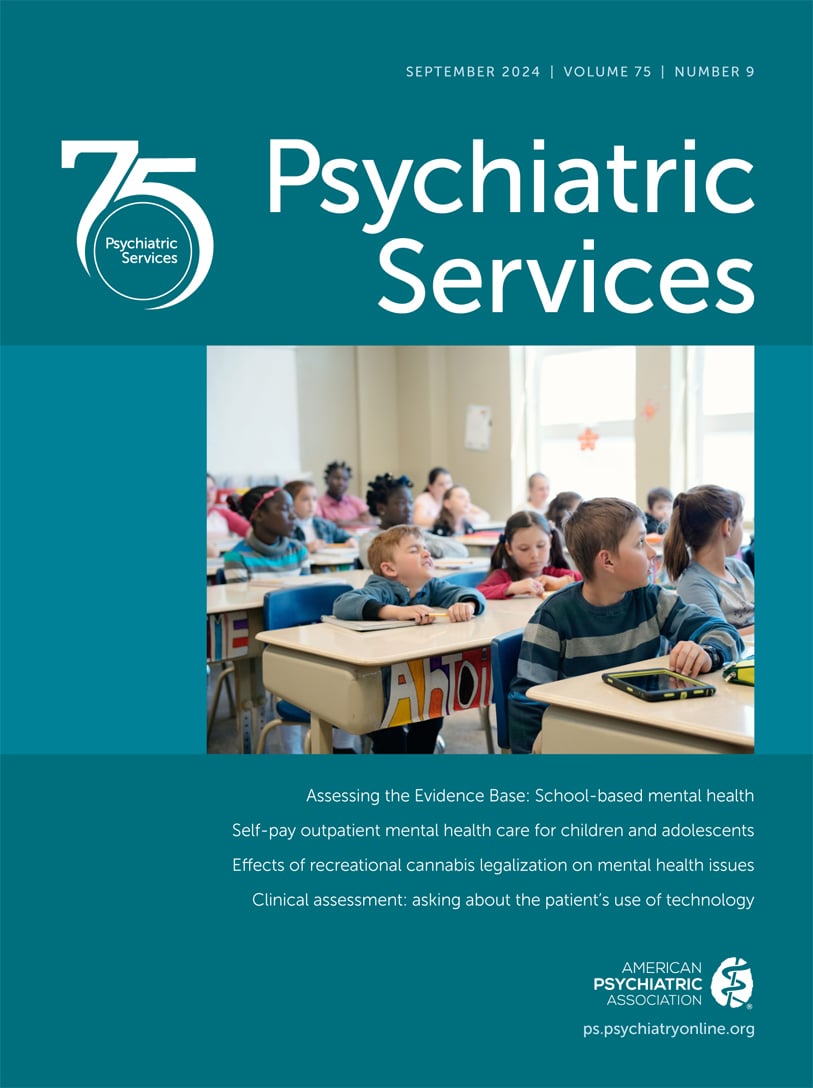Psychiatric Services
- Volume 68
- Number 3
- March 2017
Taking Issue
Articles
Publication date: 01 December 2016
Pages218–224Objective: Assertive community treatment (ACT) is one of the few evidence-based practices for adults with severe mental illness. Interest has slowly waned for ACT implementation. Yet ACT remains an appealing services platform to achieve the triple aim of ...
https://doi.org/10.1176/appi.ps.201600100Publication date: 17 October 2016
Pages225–230Objective: Little is known about the quality of inpatient psychiatric care. This study examined associations between performance on seven measures of inpatient psychiatric quality and hospital ownership. Methods: The study design was a cross-sectional ...
https://doi.org/10.1176/appi.ps.201600074Publication date: 01 November 2016
Pages231–237Objectives: To determine whether there are racial or ethnic disparities in receipt of U.S. Department of Veterans Affairs (VA) psychotherapy services for veterans with posttraumatic stress disorder (PTSD), the authors examined the odds of receipt of any ...
https://doi.org/10.1176/appi.ps.201600086Publication date: 17 October 2016
Pages238–244Objective: The purpose of this study was to describe the epidemiology of anxiety-related emergency department (ED) visits in the United States and assess the care provided during those visits. Methods: Data from the 2009–2011 National Hospital Ambulatory ...
https://doi.org/10.1176/appi.ps.201600148Publication date: 01 November 2016
Pages245–249Objective: Title 42 of the Code of Federal Regulations Part 2 (42 CFR Part 2) controls the release of patient information about treatment for substance use disorders. In 2016, the Substance Abuse and Mental Health Services Administration (SAMHSA) released ...
https://doi.org/10.1176/appi.ps.201600138Publication date: 17 October 2016
Pages250–257Objective: This study examined preferences for and acceptability of treatments for obsessive-compulsive disorder (OCD). Methods: Through an online survey, adults who self-reported OCD chose their preferred evidence-based treatments, rated acceptability of ...
https://doi.org/10.1176/appi.ps.201600092Publication date: 17 October 2016
Pages258–263Objective: Injured patients presenting to acute care medical settings have high rates of posttraumatic stress disorder (PTSD) and comorbidities, such as depression and substance use disorders. Integrating behavioral interventions that target symptoms of ...
https://doi.org/10.1176/appi.ps.201500458Publication date: 17 January 2017
Pages264–270Objective: The study examined the impact of a peer navigator program (PNP) developed by a community-based participatory research team and used with a group of African Americans with serious mental illness who were homeless. Methods: Sixty-seven research ...
https://doi.org/10.1176/appi.ps.201600134Publication date: 01 November 2016
Pages271–277Objective: Although supported employment increases job acquisition for people with serious mental illness, data on participants’ job tenure have been variable. This study evaluated the effects of a standardized work skills training program (the Workplace ...
https://doi.org/10.1176/appi.ps.201500171Publication date: 17 October 2016
Pages278–287Objective: A random-effects meta-analysis of studies that used Markov transition probabilities (TPs) to describe outcomes for mental health service systems of differing quality for persons with serious mental illness was implemented to improve the ...
https://doi.org/10.1176/appi.ps.201500523Open Forum
Publication date: 15 August 2016
Pages288–290The purpose of this Open Forum is to highlight strategies that can be implemented by federal health care policy makers to improve the delivery of effective behavioral health care services in the public and private sectors. The recommendations can be ...
https://doi.org/10.1176/appi.ps.201500532Publication date: 03 October 2016
Pages291–294The author discusses a pragmatic approach to decisions about coercive treatment that is based on four principles from principle-based ethics: respect for autonomy, nonmaleficence, beneficence, and justice. This approach can reconcile psychiatry’s ...
https://doi.org/10.1176/appi.ps.201600066Datapoints
Personal Accounts
Brief Reports
Publication date: 17 October 2016
Pages295–298Objectives: This report identifies the institutional barriers to, and benefits of, buprenorphine maintenance treatment (BMT) integration in an established hospital-based opioid treatment program (OTP). Methods: This case study presents the authors’ ...
https://doi.org/10.1176/appi.ps.201500501Publication date: 01 December 2016
Pages299–302Objective: The authors examined consumer outcomes before and after implementing CommonGround, a computer-based shared decision-making program. Methods: Consumers with severe mental illness (N=167) were interviewed prior to implementation and 12 and 18 months ...
https://doi.org/10.1176/appi.ps.201500468Publication date: 03 January 2017
Pages303–305Objective: The study evaluated the presence of mental health providers in the Medicare Shared Savings Program (MSSP) accountable care organizations. Methods: On the basis of data for all 105,155 providers participating in the 220 MSSPs in 2012 and 2013, ...
https://doi.org/10.1176/appi.ps.201600119Correction
Letters
Past Issues
View Issues Archive
Vol. 75 | No. 12

Vol. 75 | No. 11

Vol. 75 | No. 10
